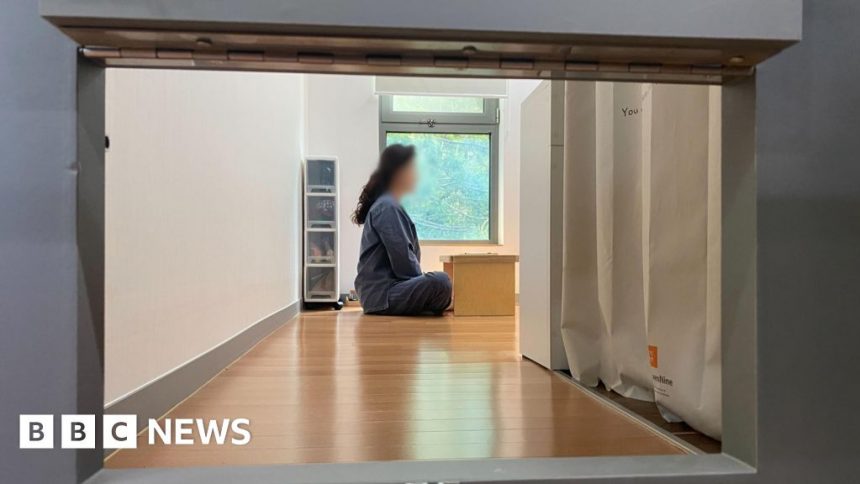Why parents are locking themselves in cells at Korean ‘happiness factory’
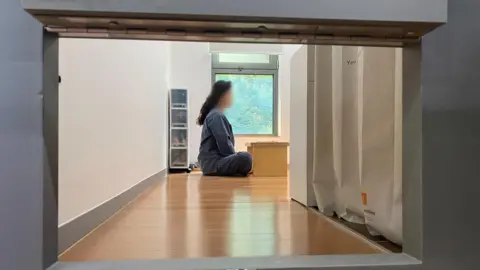 Korea Youth Foundation
Korea Youth FoundationThe only thing connecting each tiny room at the Happiness Factory to the outside world is a feeding hole in the door.
No phones or laptops are allowed inside these cells, which are no bigger than a store cupboard, and their inhabitants have only bare walls for company.
Residents may wear blue prison uniforms but they are not inmates – they have come to the centre in South Korea for a “confinement experience”.
Most people here have a child who has fully withdrawn from society, and have come to learn for themselves how it feels to be cut off from the world.
Solitary-confinement cell
Reclusive young people like these residents’ children are referred to as hikikomori, a term coined in Japan in the 1990s to describe severe social withdrawal among adolescents and young adults.
Last year, a South Korean Ministry of Health and Welfare survey of 15,000 19- to 34-year-olds found more than 5% of respondents were isolating themselves.
If this is representative of the wider population of South Korea, it would mean about 540,000 people were in the same situation.
Since April, parents have been participating in a 13-week parental education programme funded and run by non-governmental organisations (NGOs) the Korea Youth Foundation and the Blue Whale Recovery Centre.
The aim of the scheme is to teach people how to communicate better with their children.
The programme includes three days in a facility in Hongcheon-gun, Gangwon Province, where participants spend time in a room that replicates a solitary-confinement cell.
The hope is isolation will offer parents a deeper understanding of their children.
‘Emotional prison’
Jin Young-hae’s son has been isolating himself in his bedroom for three years now.
But since spending time in confinement herself, Ms Jin (not her real name) understands her 24-year-old’s “emotional prison” a little better.
“I’ve been wondering what I did wrong… it’s painful to think about,” the 50-year-old says.
“But as I started reflecting, I gained some clarity.”
Reluctance to talk
Her son has always been talented, Ms Jin says, and she and his father had high expectations of him.
But he was often ill, struggled to maintain friendships and eventually developed an eating disorder, making going to school difficult.
When her son began attending university, he seemed to be doing well for a term – but one day, he totally withdrew.
Seeing him locked in his room, neglecting personal hygiene and meals, broke her heart.
But although anxiety, difficulties in relationships with family and friends, and disappointment at not having been accepted into a top university may have affected her son, he is reluctant to talk to her about what is truly wrong.
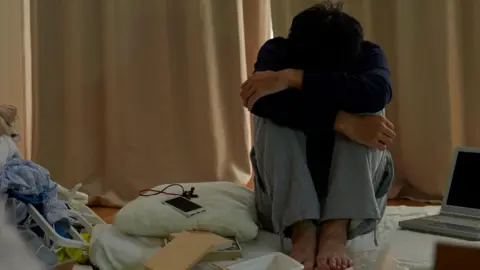 Getty Images
Getty ImagesWhen Ms Jin came to the Happiness Factory, she read notes written by other isolated young people.
“Reading those notes made me realise, ‘Ah, he’s protecting himself with silence because no-one understands him’,” she says.
Park Han-sil (not her real name) came here for her 26-year-old son, who cut off all communication with the outside world seven years ago.
After running away from home a few times, he now rarely leaves his room.
Ms Park took him to a counsellor and to see doctors – but her son refused to take the mental-health medication he was prescribed and became obsessed with playing video games.
Interpersonal relationships
While Ms Park still struggles to reach her son, she has started to better understand his feelings through the isolation programme.
“I’ve realised that it’s important to accept my child’s life without forcing him into a specific mould,” she says.
Research by the South Korean Ministry of Health and Welfare suggests there are a variety of factors driving young people to cut themselves off.
According to the ministry’s survey of 19- to 34-year-olds, the most common reasons are:
- difficulties finding a job (24.1%)
- issues with interpersonal relationships (23.5%)
- family problems (12.4%)
- health issues (12.4%)
South Korea has some of the highest suicide rates in the world and last year, its government unveiled a five-year plan aiming to address this.
Ministers announced there would be state-funded mental health check-ups for people aged 20-34 every two years.
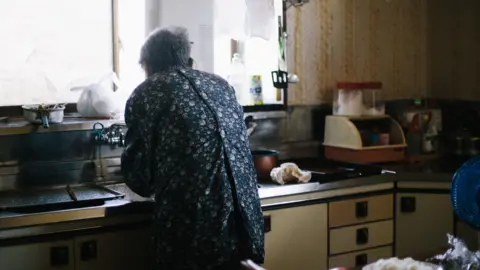 Getty Images
Getty ImagesIn Japan, the first wave of young people isolating themselves, in the 1990s, has led to a demographic of middle-aged people dependent on their elderly parents.
And trying to support their adult children on just a pension has caused some older people to fall into poverty and depression.
Prof Jeong Go-woon, from Kyung Hee University sociology department, says Korean society’s expectation that big life milestones should be reached at set times amplifies young people’s anxiety – especially in times of economic stagnation and low employment.
The view that a child’s achievements are a parental success contributes to entire families sinking into the quagmire of isolation.
And many parents perceive their child’s struggles as a failure in upbringing, leading to a sense of guilt.
“In Korea, parents often express their love and feelings through practical actions and roles rather than verbal expressions,” Prof Jeong says.
“Parents financing their children’s tuition fees through hard work is a typical example of a Confucian culture that emphasises responsibility.”
This cultural emphasis on hard work may reflect South Korea’s rapid economic growth in the second half of the 21st century, when it became one of the world’s major economies.
However, according to the World Inequality Database, the country’s wealth inequality has worsened over the last three decades.
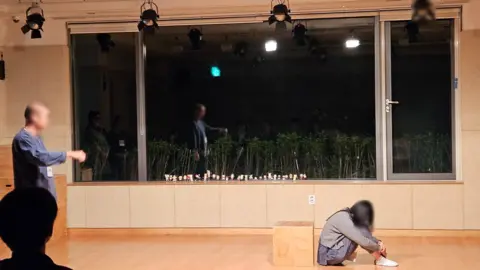 Korea Youth Foundation
Korea Youth FoundationBlue Whale Recovery Centre director Kim Ok-ran says the view that self-isolating young people are a “family problem” means many parents also end up cutting off those around them.
And some are so afraid of being judged they cannot even talk to close family members about their situation.
“They can’t bring the issue out into the open, leading to the parents themselves becoming isolated as well,” Ms Kim says.
“Often, they stop attending family gatherings during holidays.”
‘Watching over’
The parents who have come to the Happiness Factory for help are still eagerly awaiting the day their children can resume a normal life.
Asked what she would say to her son if he came out of isolation, Ms Jin’s eyes fill with tears.
“You’ve been through so much,” she says, voice trembling.
“It was hard, wasn’t it?
“I’ll be watching over you.”
If you have been affected by any of the issues raised in this article you can find sources of help from BBC Action Line.



